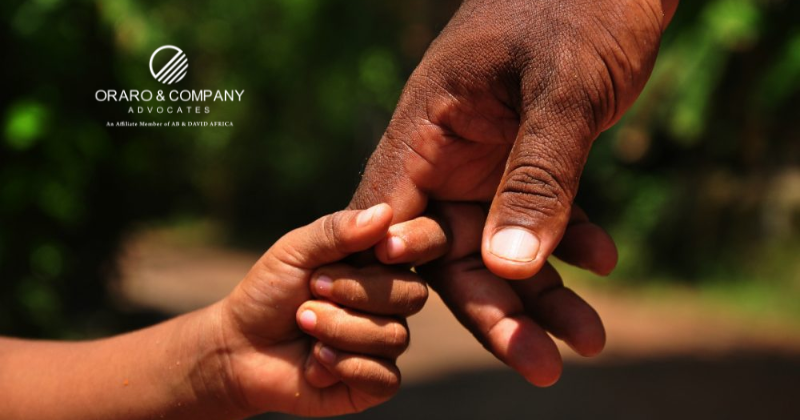- Introduction
This coming Sunday, 19th June 2022, will be a special day dedicated to fathers worldwide and we at Oraro & Company Advocates, would like to join in the tribute.
In line with our appreciation, we dedicate this article particularly to the Kenyan fathers, as we reflect on recent developments in child custody matters.
A father’s place in any child’s life cannot be ignored and extensive research has been done on the role of fathers in children’s lives. In parental disputes, however, there is often a prevalent assumption, that fathers cannot adequately take care of their children. This has informed the layman’s view, that mothers are most likely to be granted custody by courts, when there is a custody dispute.
It is on this premise, that we would like to address the Kenyan position, regarding fathers and child custody.
2. Understanding Child Custody
First, it is imperative to deconstruct the terms “Child” and “Custody” within their underlying legal framework. It is noteworthy that the Constitution, the Children Act (No.8 of 2001) and international conventions vide Article 2(5) and (6) of our Constitution, largely regulate matters of child custody in Kenya.
A child is defined in section 2 of the Children Act as any human being below the age of 18 years. On the other hand, section 81 of the Act defines custody as the parental rights and duties relating to the possession of the child. There are the two main types of custody, as per sections 81(1)(c) and (d) of the Act. These are, “Legal custody” and “Actual custody.”
Legal custody is defined as the parental rights and duties to possession of a child as conferred by a court order, while actual custody is understood to mean the actual possession of the child, whether or not such possession is shared between different persons.
The simplest distinction to these seemingly conflicting definitions, is that legal custody is parental entitlement and responsibility granted by a court order, while actual custody focuses on the physical custody of the child by a parent.
In all matters involving custody, the Constitution stipulates in Article 53(2) that the best interest of the child should be the primary concern of all parties. The same principle is replicated in Sections 4(2) and (3) and 83 of the Children Act.
- General Considerations in Granting Custody
Apart from the best interest of the child, other factors the court considers include the age of the child, parental conduct and wishes, as well as the child’s ascertainable wishes.
Concerning the age of the child, the position is that a child of tender years (i.e. a child of less than 10 years) should remain with the mother, except where exceptional circumstances warrant custody to be granted to the father or other person. The Court of Appeal in J.O v S.A.O [2016] eKLR elaborated such exceptional circumstances to include the mother being unsettled, or where she has remarried or lives in deplorable conditions hence an unsuitable environment to raise a child.
Regarding parental conduct, the detrimental behaviour of a parent may influence the court to award custody to the other parent. In the case of MARTHA OLELA & ANOTHER v. JACKSON OBIERA (CA of 1979), the court considered factors such as disgraceful conduct, immorality, drunkenness and bad company kept by a parent, to award custody to the other parent.
The mental state of the parents is also considered in awarding custody. The court in JKN v HWN [2019] eKLR noted that where a parent suffers from a mental condition, the court has to ascertain whether such condition is a continuing one and whether it impacts on the parent’s fitness, to take care of the child. The court further noted that custody may be granted to the other parent, where a mental illness interferes with a parenting ability or capacity to provide a safe home environment to the child. [Emphasis supplied].
With regard to the child’s wishes, the Court in J.O v S.A.O (supra) affirmed that a child’s preference to staying with one parent over the other, should be assessed objectively. Therefore, it implied that the court can overlook a child’s wishes, where they may not be in the child’s best interest.
- Busting the myth
The right to have custody of a child is not based on the gender of the parent, it is based on law. It is an equal right for both parents with the primary consideration being “the best interest of the child” as noted above.
The above issue was discussed in JKN v HWN (supra), where the High Court (in an appellate capacity) analysed the lower court’s finding on child custody. The High Court observed inter alia as follows:
“…Lastly, it is important to point out a serious misdirection regarding the Lower Court’s reasoning in awarding custody to the Respondent. In my view, the Lower Court’s reasoning was steeped in a dangerous fallacy born of stereotypes. The Learned Trial Magistrate reasons that it is not possible for a man to be the primary caregiver because “he shall from time to time be required to attend to his bread-winning duties and will soon leave the duties to the house girls…..[therefore]….If I am to call a spade a spade, it is difficult for a man to take the role of caregiving.” The Learned Magistrate then proceeds to reason that “it would be much safer for the Respondent to take custody of the children than they be in the care of house helps…”
The two biggest problems with the reasoning in this portion of the judgment are that it assumes that:
- There is a clear and natural bifurcation between “caregiving” and “bread winning” and that men do the latter while women do the former; and
- Mothers should be given custody because they are not involved in “bread winning” (especially if they are living with a man) and that, therefore, they take care of the children themselves rather than rely on paid help. This strand of reasoning is dangerous because it somewhat implies that women who rely on paid help to supplement their caregiving work as they pursue their careers or business opportunities are somewhat giving less optimal form of caregiving than women who have chosen to be stay-at-home mothers. This is a strand of judicial reasoning that could easily send a message that “good” mothers stay home with their children while “good” fathers go out and “win bread” for the family.
With tremendous respect, I find this reasoning to be dangerously problematic. It does no favours to women to espouse these kinds of stereotypes. Moreover, relying on the stereotypes to reach a verdict on an individual and specific case is unfair to the parties concerned…” [Emphasis Supplied].
From the above commentary, the High Court noted that it was erroneous for the lower court to award custody based on societal stereotypes. On this basis, the High Court held that section 83 of the Children Act, does not direct that custody should be awarded to a particular parent.
- Conclusion
As we celebrate fathers this Sunday, applauding their efforts and important contribution to the lives of their children, we appreciate the developments in the law that recognize the critical role that fathers play in the lives of their children.
The law, as highlighted above, recognizes that both parents play an important role in parenting, even at a tender age. We encourage fathers to seek legal redress where there is a custody dispute, without the assumption that the court only recognises mothers in custody matters.
The paramount consideration must however always be, “the best interest of the child” and in considering what is in the best interest of children in custody matters, courts have over time sought to strike a delicate balance in evaluating the various factors as discussed above. Nevertheless, each case has been determined based on its own circumstances.
However, the pronouncements in the recent case of JKN v HWN (supra), indicate the increasing appreciation that fathers are being equally considered in the custodial disputes.
As we celebrate fathers this Sunday, let us reflect on the critical role they play in the lives of their children.
Happy Father’s Day Gentlemen!
Please click here to download the article.





